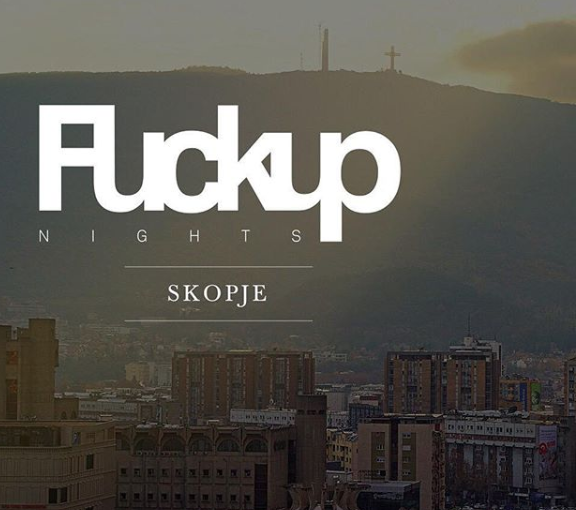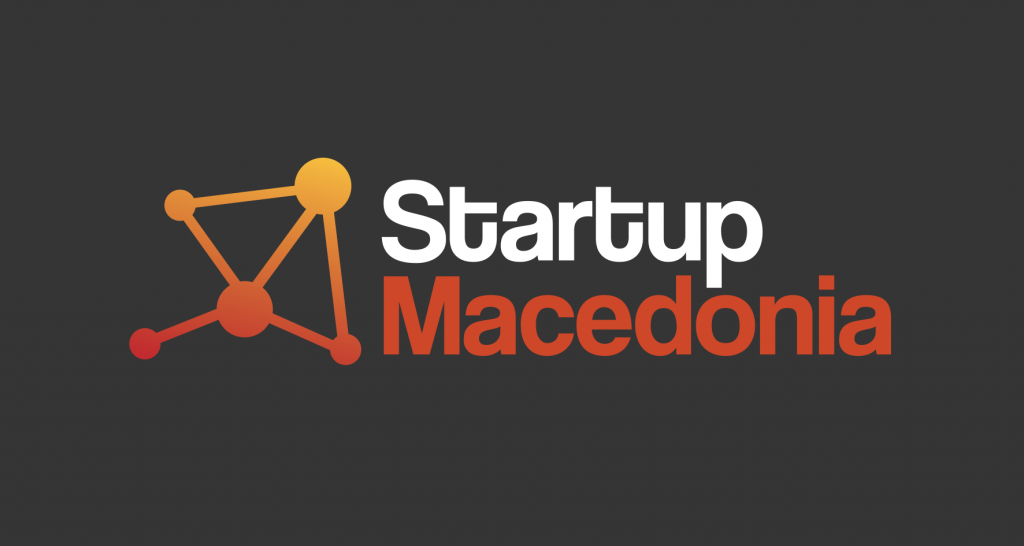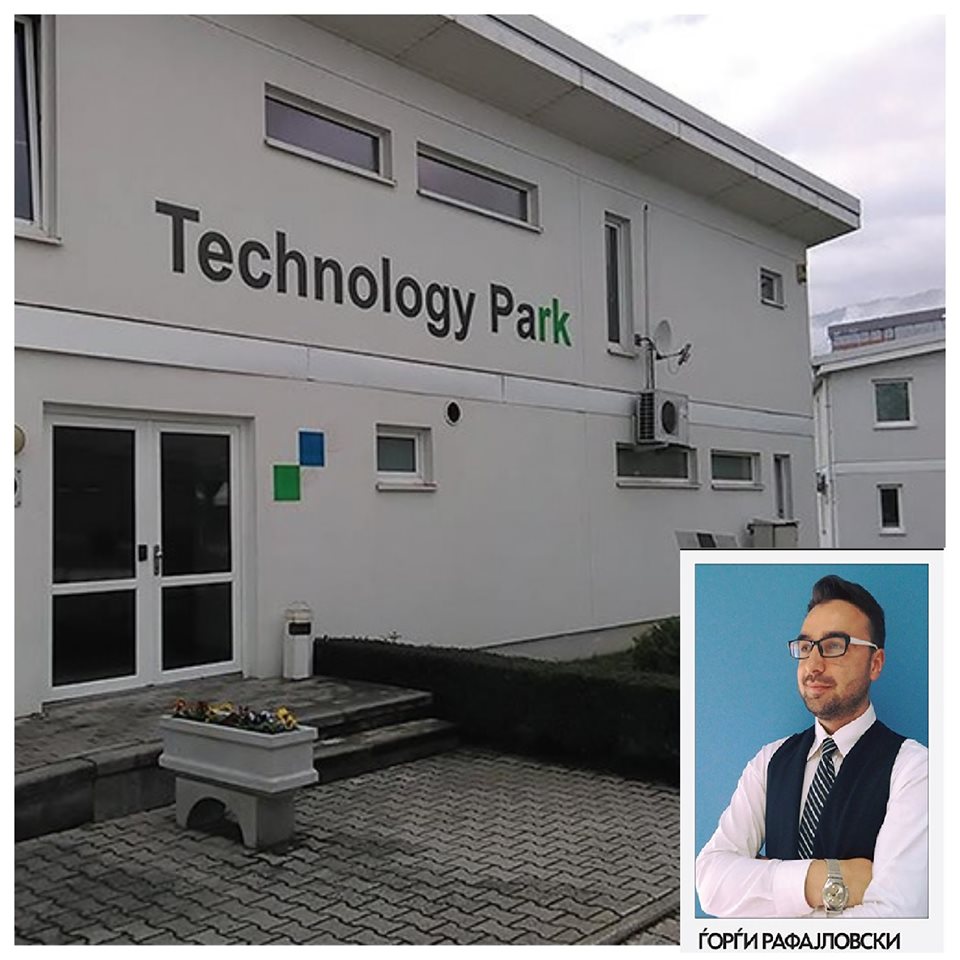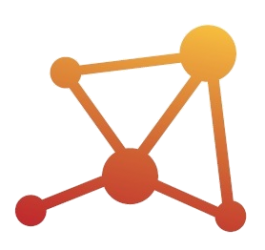FuckUp Nights Interview – Startup Macedonia Roland Simon

Can you give us a quick insight on how and why you
decided to start FuckUp Nights?
I felt there was something missing. There are a lot of great events (Womenpreneurs, Startupgrind, Swiss EP’s coffee with an expert etc.) being organized in Skopje, but they cover stories of success or how to become successful. Don’t get me wrong, these events should happen because there’s a lot of inspiration, learning and growth happening there but I believe that telling those other stories, the stories of not-so-succesful businesses, and not-so-great-business-decisions can be just as valuable – or maybe even more valuable.
Fuckup Nights is a global moment and event series that shares stories of professional failure. Each month, in events all around the globe, three to four people get up in front of a room full of strangers to share their own professional fuckup. I first heard about the concept last year summer and instantly fell in love with it. It’s a great way to get failure out of the taboo and help people break free from the limitations of how we live our lives. I figured it would be a great addition to Skopje’s startup ecosystem. I reached out to the organization, applied for a license and a few weeks later Fuckup Nights Skopje was born!
- Why did you choose to organize the platform in Skopje, Macedonia?
I wanted to encourage a culture of dialogue on success and failure, and emphasize the idea that failure is part of how we learn and grow.
- How do you think that FuckUp Nights has helped in the development of the startup ecosystem?
What I’ve seen is that not only the Fuckup Nights attendees got inspired by the openness, vulnerability and brutally honesty of the speakers. It’s the speakers themselves who found out that embracing their failures and sharing them in public actually works like therapy for them. They get to relive those mistakes and turn them into lessons learned. We’ve organized two Fuckup Nights, and although we might have only reached 100 people with these events, I believe we’re starting to make a positive impact. I hope that the Fuckup Night events help entrepreneurs stop thinking negatively about their failures, and start seeing them as opportunities to learn – to become more successful in what they’re doing.

- How has your experience being the Head of Marketing at Pixyle and Entrepreneur in Residence in Swiss EP contributed to your overall path to where you are now?
My experience here made me realize that, as Steve Jobs once famously said, ideas are indeed worthless unless executed. I’ve met some amazing entrepreneurs and they all have one thing in common: they ship early, and often. Coming from an large corporate organization – where decision-making processes more often than not took a lot of time – this thinking big, starting small and learning fast is definitely a critical lesson I learned here.
- Given your international working experience, what are your impressions of the Macedonian startup ecosystem and community so far?
Although it’s a small community, there is very much a sense of a startup community were people are willing to make time, share knowledge and help each other out. Apart from the warm welcomes and introductory coffees I still have with local people, there are weekly meetups and there are numerous other events. Now with Covid-19 happening, we’ve seen the resilience, agility and willingness to collaborate even more, with for instance the Brainster Talk / Swiss EP online webinars. Great to see the community being so supportive.

- Do you have any tips/suggestions and predictions about the Macedonian startups and the community as a whole?
I’ve met some great engineers who’re building great digital products. However, from my perspective as a marketer, I believe in next to building a great product, startups should not forget to build their brand. It’s the brand that builds an emotional connection with the consumer, and great brands do just that: build strong emotional connections. That’s why I sometimes deliberately provoke a little bit by stating that startups shouldn’t build a product, but build a brand.
Author: Hristijan Volkanovski
Interview : Jakov Pavlovic
CALL TO ACTION – SM, Covid Crisis Webinar Call

For millions of SMEs across the continent and world struggling with both domestic and international demand due to the COVID19 lockdown, the circumstance has raised existential uncertainty. Many of those are Startups, although agile and remote friendly, have engaged in flexible reactive activities by increasing attention to day-to-day activities in managing cost more effectively and maintaining a sufficient cash flow.
While governments are also struggling to maintain economic stability in the given circumstances, many of the members of both the private sector and startup community can aid the development process by sustaining the durability in the given time. This is why we at Startup Macedonia are urging towards a proactive approach of Learning and Sharing that will help all startups by in our community make the most of the situation with a series of virtual events, webinars, which are intended to both inform and educate the Startup and SME sector while all things considered are at a halt point.
The initial idea is to invite all members of the Macedonian Startup Community to be proactive and send us links and information about their future Online events, courses and/or webinars. Our goal is to offer a larger reach for people curious in developing and increasing their knowledge by aiding in the process of digital transformation necessary for this challenging period. All organizations who are supporters of the community, stakeholders, members, as well as the startups themselves are free to send us links and information about their virtual events, webinars and courses via email at startupmacedonia.platform@gmail.com, or contact us through our Facebook Page – Startup Macedonia. As far as preferred content, the given virtual events, webinars and courses should include guidance and material that are suitable for the Macedonian Startup Community, possibilities for their growth, interesting and effective solutions during the COVID19 crisis, innovation and ideas that help the private sector fight the drop in economic activity due to the crisis, advice for remote work allocation management and etc. Regarding the recent and future activities so far, that have been implemented by organizations in support of the Macedonian Startup Community, anyone interested can find more about them on our Startup Digest Platform.
Startup Macedonia is continuously working closely with all Macedonian Startups and Scaleups that supply their products and/or services on the foreign market to localize their products and adapt their supply to the domestic market as well. The reason for this is the increase and gain in development and sustainability within the domestic private sector that will serve as support for the economic improvement as a whole. All interested Startups can send up to three offers to Startup Macedonia that will include their ideas for domestic market entrance.

Startup Macedonia is continuously working closely with all Macedonian Startups and Scaleups that supply their products and/or services on the foreign market to localize their products and adapt their supply to the domestic market as well. The reason for this is the increase and gain in development and sustainability within the domestic private sector that will serve as support for the economic improvement as a whole. All interested Startups can send up to three offers to Startup Macedonia that will include their ideas for domestic market entrance.

Also, contributions that include product adaptability and solutions during the COVID19 by local Startups will be found on an upcoming website link. For now, it includes product/service offers that are of use to Macedonian Companies for free during the quarantine period including solutions from startups like FitKit, Codewell, Pixyle.ai, Sales.Rocks and etc.
About Startup Macedonia:
Macedonia is under-used potential for innovation that has yet to be discovered. In order to release the full potential of startups in Macedonia we need an ecosystem that will support their development. Therefore, Startup Macedonia is here to help!
Startup Macedonia has three focus areas. The first is digitalization of the ecosystem by making the ecosystem visible through data and measurable KPIs. The second is helping the startup support organizations to improve and accommodate their services according to the market needs. The last one is to make the Macedonia One Single Connected Hub and strengthen the Macedonian networks nationally and internationally.
Author: Jakov Pavlovic
CEE Poland Accelerator Program (MIT)
Deadline 8th of March

The Foundation for Technology Entrepreneurship is a key player in the Polish and CEE innovation ecosystems with its flagship acceleration program called MIT Enterprise Forum CEE https://mitefcee.org/, affiliated with the Massachusetts Institute of Technology.
Last October we launched first edition of CEE Accelerators Summit, which gathered 15 institutions from 9 countries. This event was aimed at laying foundations for close cooperation between CEE innovation ecosystem leader.
The organizer of the MIT Enterprise Forum CEE program is the Foundation for Technology Entrepreneurship, which has so far implemented, among others, five editions of the MIT Enterprise Forum Poland program for Polish technological startups, as well as the Bridge 2 MassChallange Warsaw acceleration program addressed to startups from CEE countries. The Foundation for Technology Entrepreneurship cooperates with leading and Polish enterprises and its activities have had the patronage of, among others, the Ministry of Development or the Ministry of Science and Higher Education as well as the Polish Investment and Trade Agency. The Foundation is a one of a kind organization on the Polish market that offers effective and comprehensive preparation of corporations to implement innovation by means of cooperating with startup companies.
MIT Enterprise Forum CEE is part of the global network of MIT Enterprise Forum, affiliated with the world’s best technology university – the Massachusetts Institute of Technology. The aim of the program is to support the development of the most innovative startups from Central and Eastern Europe by combining their potential with the knowledge and resources of leading enterprises and the experience of Polish and international mentors.

The CEE Accelerator Summit, powered by Enterprise Forum, will be held this autumn in Warsaw Poland with a foundation of supporting Technological Entrepreneurship lining programs from major accelerators such as Enterprise Forum focused on supporting early stage technology startups in developing and fine tuning their business model, Bridge To MassChallenge pilot program designed to support CEE based startups with market traction, ESA (Business Incubation Center) program supporting entrepreneurs in turning their space-related business in commercial companies and Smartup Accelerator aimed at supporting the startup ecosystem in the cleantech sector.
Check what benefits you will get by being a part of an elite ecosystem of our partner @MIT Enterprise Forum CEE:
- Establish cooperation with leading Polish and international companies representing various industries, including insurance, finance, Industry 4.0, lifescience, energy, FMCG, smart buildings and others.
- Receive up to EUR 50,000 grant for business development.
- Receive up to EUR 10,000 grant for individual advisory services in the field of law, patent protection, HR, team building, or sales.
- Participate in three workshop sessions focused on validation of business start-ups’ assumptions using “The 24 Steps of Disciplined Entrepreneurship”.
- Participate in subject-matter workshops with corporate and patent attorneys, pitch trainer and sales coaches.
- Catalyse pilot and commercial implementation of products in accelerator’s partner companies.
- Gain access to global networking opportunities and present innovations to potential US partners and investors.
See the regulations of determined rules for recruitment and participation in the individual acceleration program for those interested in applying: https://mitefcee.org/wp-content/uploads/2020/01/Terms-Conditions_MIT-EF-CEE_3rd-edition_eng-1.pdf
Author: Jakov Pavlovic
На муабет со Оперативниот директор на SEUUTechCamp – Гого Рафајловски
Гого Рафајловски е ментор за иновации, стартап аналитичар и човекот кој знае да ги одговори повеќето прашања поврзани со авторски права и заштита на интелектуална сопственост
- Кој е Ѓорѓи Г. Рафајловски и што работи?
Во моментов, работам како Оперативен менаџерна SEEUTechPark, првиот Технолошки Парк во Македонија.Ние ги поамагаме иновативните старт-ап и спин-оф бизниси кон нивниот забрзан раст и развој надвор од земјата. Ова го правиме преку серија на структурни и индивидуални програми – специјално дизанирани за секоја компанија одделно.
Инаку, моето тековно 12-годишноискуство е поврзано со старт-ап центри и бизнис-инкубатори,кое успевам да го комбинирам со академското знаење како Магистер по интелектуална сопственост, специјализиран за вреднување на трговските марки и нематеријалните средства.

2.Може ли да објасните нешто повеќе за интелектуалната сопственост и што таа претставува?
Во најкратки црти, интелектуалната сопственост претставува токму тоа –еден вид на сопственост, која што малкумина индивидуи и бизниси не се свесни дека ја поседуваат, затоа што не е изразена во стандардни форми како: пари, машини, опрема, алати или згради.
Всушност, тоа се нематеријалните творби, или невидливи добра, кои се производ на човечкиот креативен ум и интелект, и чија вредност на пазарот понекогаш е поголема од тоа што можеме да го претпоставиме.

3. Според вас, кои се 5-те најважни работи кои што еден стартап треба да ги знае?
Секој стартап, без разлика од која средина или земја доаѓа, добро е да ги знае следниве работи:
- Во модерното општество, или општество базирано на знаење и ултра брз проток на информации – вештините, иновациите, брзината и алатките за нивно користење се највредното нешто што може да го поседувате.
- Денес, најдобрите бизниси не се оние најголемите, туку оние бизниси кој најпаметно ги комбинираат: технологиите, информациите и дигиталните алатки на најефикасен можен начин за нив и нивните клиенти.
- Ако правилно се искористи, интелектуалната сопственост може да ви додава вредност во секоја од фазите на раст за вашиот бизнис – од самата идеја, па се до меѓународна експанзија.
- Сите ние траба да научиме да ги препознаваме, заштитиме и менаџираме правата од интелектуална сопственост, затоа што тоа носи дополнителна материјална вредност и поголеми финансиски придобивки.
- Понегогаш, воопшто не е скапо за еден стартап да заштити конкретно дело, бизнис-план или индустриски дизајн, ако мудро се постапува.

4.Мене лично ми беше најинтересно кога разговаравте за трговските тајни. Која е разликата помеѓу заштитата на трговска тајна и патентна заштита?
Трговска тајна е генерално било каква доверлива информација, ставена на материјална подлога. Иако, постојат минимум критериуми кои мора компанијата да ги исполнува за да ова се ефектуира, всушност е многу лесен и евтин начин да заштитите некоја деловна информација од вашата конкуренција.
Од друга страна пак, патентите се стекнати права врз основа на формална регистрација на одреден пронајдок, кој обезбедува т.н. „монопол“ на бизнисот за одреден временски период. Процесот на патентирање за еден стартап е обично прилично долг и поскап процес, поврзан со административни и регулаторни постапки.
Но, на самиот стратап останува да одбере соодветена стратегија, или комбинација од стратегии кои можат барем нинимално да заштитатнекои аспекти кои се важни во нивното работење.
На пример, малкумина знаат дека големата компанија „Coca Cola“, својата тајна формула за кола ја нема патентирано, туку има превземено соодветни чекори за нејзина заштита како трговска тајна. Ова доаѓа од простата причина што рокот на трговските тајни е неограничен, во споредба со официјалната заштита преку патентирање, која трае само одреден временски период. Паметно, зарем не?

5.Како да се заштитиме меѓународно како бренд?
Ова е едно од најчестите, но и најкомплексните прашања за одговор кога станува збор за правата од интелектуалната сопственост. Едноставниот одговор е – не постои еден единствен процес и унифициран критериум да се заштитите како компанија или бренд.
Обично тоа е континуриран процес кој комбинира успешна работа, вложување во иновации, маркетинг и продажни активности, но и многу други параметри.
Она што треба да го правите, е да утврдите кои аспекти од бизнисот, работењето или брендот ви се важни во овој момент, и како најдобро и најефикасно да го заштитите тоа што во моментот го поседувате, тоа што може да ви донесе предност пред конкуренцијата, и да работите на таа заштита.
Строго е препорачливо да се советувате со правни и стручни лица, за најефикасна заштита на вашиот бизнис. Не гледајте примери од други светски или мега-успешни компании кои не се применливи во нашата средина.
6.Што е трансфер на техонлогии и како можеме да го заштитиме програмскиот код?
Трансфер на технологии претставува пренос, или отстапување на конкретно право од интелектуаланата сопственост, во комбинација со други права, на трети лица. Најчест пример за ова се: лиценците, франшизите, договор за т.н. ‘know-how’, класични консултантски услуги и најпопуларното во старт-ап заедницата: NDA (Non-Disclosure Agreement).
Старт-ап бизнисите кои работат во софтверската индистрија се често недобро информирани за тоа кој е најдобар начин да го заштитат компјутерскиот код.
Важно е да се нагласи, дека корпусот на права од интелектуална сопственост се различно регулирани во земјите од англо-саксонскиот и континенталниот правен систем, а дополнителен проблем преставува фактот што истите тие во рамкките на Евро-континенталниот систем и не се докрај хармонизирани. Особено кога станува збор за софтвер или компјутерски имплементирани пронајдоци, а мошне специфично кога софтверот претставува спроведување на некој бизнис метод.
Па така, генерално, софтверот е заштитен од самото креирање како авторско дело без потреба да се патентира, но во САД на пример, можно е и нагово патентирање. Низ Европа пак, начелно компјутерската програма што имплементира бизнис процес не е изум, но компјутерска програмата што имплементира индустриски процес може да биде.
Понекогаш е доволно да се искомбинираат повеќе методи на заштита, за да се добие најадекватаната за вашиот бизнис или старт-ап… која патем, можеби и нема да ве чини скапо.

7.Што е индустриски дизајн и дали може дизајнот да се заштити?
Индустрискиот дизајн е право на индустриска сопственост со кое се штити нова форма на: тело, слика, цртеж, контура, композиција на бои или нивна комбинација, и да тој подлежи на формална заштита проследена со соодветна апликациска процедура.
Она што е важно да се напомене е дека, заштитата преку индустрискиот дизајн се однесува само на естетскиот аспект, односно на надворешниот изглед на производот, а не на неговите фукционалности.
8.Дали народен дезен подлежи на заштита преку дизајн?
Не, затоа што народното творештво обично спаѓа во доменот на јавно добро. Сепак, современите адаптации и толкувања на традиционалните дизајни направени од страна на поединци може да бидат доволно „оригинални“ и „нови“,оттука и подобни за заштита преку индустриски дизајн.

9.Објаснете на кратко што е GDPR.
General Data Protection Regulation (GDPR)е новата Регулатива на ЕУ за заштита на лични податоци. Регулатива се однесува на заштитата на личните податоци и слободното движење на податоци, а целта на истата е хармонизација на легислативата во цела Европа, да ја подигне на повисоко ниво заштитата на личните податоци во чекор со новите дигитални достигнувања и различните цели и начини на кои се обработуваат личните податоци.
Интервју: Беркан Асановски
Дизајн: Марија Димовска
